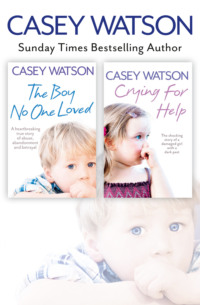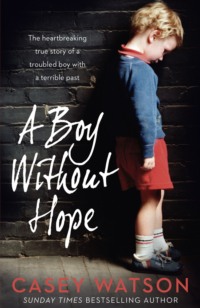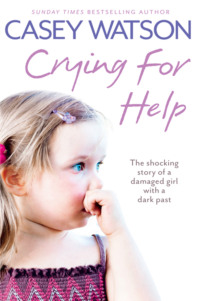
Полная версия
Runaway Girl: A beautiful girl. Trafficked for sex. Is there nowhere to hide?


Copyright
This book is a work of non-fiction based on the author’s experiences. In order to protect privacy, names, identifying characteristics, dialogue and details have been changed or reconstructed.
HarperElement
An imprint of HarperCollinsPublishers
1 London Bridge Street
London SE1 9GF
www.harpercollins.co.uk
First published by HarperElement 2016
FIRST EDITION
© Casey Watson 2016
A catalogue record of this book is available from the British Library
Cover image © Yolande de Kort/Arcangel Images (posed by model)
Cover layout © HarperCollinsPublishers 2016
Casey Watson asserts the moral right to be identified as the author of this work
All rights reserved under International and Pan-American Copyright Conventions. By payment of the required fees, you have been granted the nonexclusive, non-transferable right to access and read the text of this e-book on screen. No part of this text may be reproduced, transmitted, downloaded, decompiled, reverse engineered, or stored in or introduced into any information storage retrieval system, in any form or by any means, whether electronic or mechanical, now known or hereinafter invented, without the express written permission of HarperCollins e-books.
Find out about HarperCollins and the environment at
www.harpercollins.co.uk/green
Source ISBN: 9780008142582
Ebook Edition © October 2016 ISBN: 9780008142599
Version: 2016-12-19
Contents
Cover
Title Page
Copyright
Dedication
Acknowledgements
Preface
Chapter 1
Chapter 2
Chapter 3
Chapter 4
Chapter 5
Chapter 6
Chapter 7
Chapter 8
Chapter 9
Chapter 10
Chapter 11
Chapter 12
Chapter 13
Chapter 14
Chapter 15
Chapter 16
Chapter 17
Chapter 18
Chapter 19
Chapter 20
Chapter 21
Epilogue
Topics for Reading Group Discussion
Moved by Runaway Girl?
Casey Watson
Moving Memoirs eNewsletter
About the Publisher
Dedication
I’d like to dedicate this book to all those working in the care system in one form or another, for their dedication, hard work, and constant pushing for change and improved services for our young people. Despite budget cuts, government changes and constantly having to adapt to an increasing workload, you still strive for that light at the end of the tunnel. As a result, someone else in the care system will thrive, someone else will have a fair shot at a good life. I feel so proud to be able to be part of this, and if you, the reader, are thinking about joining the ranks of social care in some form, just go ahead and do it. The rewards far outweigh the difficulties we face.
Acknowledgements
As always, I’d like to thank my wonderful, dedicated team at HarperCollins. They have championed me from the start and continue to do so despite difficult times. My very patient agent, Andrew Lownie, deserves a medal for what he does, and it goes without saying how much I appreciate all he has done and continues to do. Thank you so much, Andrew. And as always, special thanks to my wonderful friend and mentor, Lynne. You know what an inspiration you are!
Preface
Around 3,000 children arrive in the UK alone every year seeking asylum, and unfortunately an estimated 5,000 young people – almost all of them girls – have been trafficked here since the late nineties. Our government then struggles to navigate ‘complex and adult systems’ (i.e. those designed for adults, as no one imagined children would migrate alone) to get them the support they need. They are sometimes known as ‘hidden children’.
Chapter 1
January
There is a grandparenting moment – and it’s one of the best ones – when, after a great deal of patience and fortitude, not to mention finger-crossing, you realise that you have finally got the baby off to sleep. And, though you love them (and with an intensity that can take your breath away), you are mighty glad that you can do the proverbial, and give them back to your offspring again.
It was into one such moment that my mobile exploded into life. My mobile that I’d forgotten I still had on me.
‘Bloody hell, Case!’ hissed Mike as I scrabbled to try to silence it. Which was a case of frantically slapping both hands over the offending cardigan pocket to muffle it, and beating a hasty retreat, backwards, from Dee Dee’s bedroom.
And by some miracle, despite the shocking cacophony, she didn’t stir. I missed the call, though, having clattered down the stairs before attempting to answer it, and gone back into the living room. And shut the door, for good measure.
I finally pulled the phone out, long after it had ceased warbling at me, while Mike relocated the baby monitor to the coffee table, glaring at it as if willing it to remain silent. It had been a long, fraught hour getting the baby off, to be fair.
‘Oh,’ I said, ‘it’s John. As in Fulshaw. Wonder what he wants.’
Mike flumped down on the sofa beside me. ‘Well, if it’s “Would you mind taking in another ten-month-old baby?”, that’ll be a no.’
‘Oh, hush,’ I said. ‘Go and make some coffee and stop moaning. She’s down now, and she’ll stay down. You know what she’s like.’
‘I’m not surprised,’ said Mike, with feeling. ‘What is it about flipping babies? I’ve never really got that. When you’re tired you go to sleep. Problem solved. Easy. Why do they have to make it so difficult?’
I grinned at him, already pressing the return-call button on my mobile. As a veteran of two kids, four grandkids, and the various little ones we’d fostered, he knew that was one of the great unanswered questions precisely because there would never be an answer to it. An overtired baby was a simple but complicated beast; she was overtired, but the reasons could be myriad, from colic, to teething, to being too hot, cold or stimulated – it could even be the smell of my new perfume. But we’d got there and could relax now … well, after a fashion. And possibly not for long, given the call.
‘Hi there, John,’ I said moments later. ‘So. To what do we owe the pleasure?’
‘Oh, dear,’ he said. ‘I’m sorry to be calling you so late.’
‘It’s only eight, John. It’s fine,’ I reassured him. Though, while doing so, I was already taking stock of why he’d be calling. It was outside of office hours, so nothing routine or training-related, clearly. Which presumably meant a child he wanted us to take in.
Mike had picked up our coffee mugs but still lingered in the living room, obviously thinking the same thing.
‘We’ve got a teenager on the way,’ John explained, and I mouthed the word to Mike, who nodded. ‘Coming to us via a rather circuitous route. Not from round here – well, to be precise, not from anywhere remotely round here. She’s a Polish girl, apparently – not been long in the country, and all out of options.’
‘What’s happened to her?’ I asked John as Mike headed to the kitchen.
‘We’re not entirely clear yet. She doesn’t speak a lot of English and the details are sketchy. Very sketchy. So, to be truthful, I have no idea what we’re dealing with yet.’
John not having any idea what we’d be dealing with was the case more often than not, so this, in itself, didn’t faze me. Nor did what he did know – that she was 14, and had turned up at a social services building earlier, very distraught, in Hull, some 100 miles away. And, with no room at the inn via the local out-of-hours service, the ‘problem’ had eventually made its way to our fostering agency, and, as John was the supervising social worker and manager of our local office, to us.
‘I’m expecting her within the hour,’ he explained. ‘Are you and Mike able to take her in? More to the point, are you even around? I did try the house phone.’
I explained that we were round at my son Kieron’s house, babysitting his and his partner Lauren’s baby daughter. ‘But that’s no big stress,’ I added. ‘They’ve only gone to the cinema. They’ll be back in less than that, and then we can shoot home.’
‘I’d be enormously grateful,’ John said, and he sounded it. ‘As I say, I’ve no idea what the deal is. The girl’s apparently quite distressed, says she has nowhere to go, and has obviously been sleeping rough for a while. But I’m told she’s otherwise healthy and seemingly sane; says she’s not been harmed in any way.’
‘D’you know any more than that?’ I asked him, already forming a mental picture. Otherwise healthy and seemingly sane. I wondered what it must be like to be a 14-year-old girl all alone in a big, scary city.
‘Not really. Only assumptions. You know what it’s like. She says she has no parents, and nowhere to go back to, but that’s probably questionable. We’ve seen it before, to be honest; parents sending their kids over here when they can’t support them, with little more than a note with their name and age. And the kids are usually savvy enough not to give any details. But we shall see, eh?’
Indeed we would, I said, feeling the usual first stirrings of intrigue. ‘So, what’s her name?’ I asked him.
‘Adrianna. Or so she said. Anyway, thanks for stepping in, Casey. Doubt you’ll have to have her long.’
I smiled at that as I disconnected. Or so he said.
The previous year had been a rather different one for us. We still had Tyler, of course, who we’d taken on permanently, and who was now a lanky 14-year-old. And he was so much a part of the family now, the ‘foster’ part of ‘foster son’ no longer even passed our lips. But after several intense years of fostering – and some harrowing experiences – we’d stepped temporarily off the hamster wheel as far as new long-term placements were concerned, and, having seen our last long-term foster child into her new forever home the previous March (a little girl with foetal alcohol syndrome called Flip), we’d begun a short fostering break.
Mostly, this was to support our son, Kieron. With him and Lauren’s first baby, Dee Dee, coming along shortly after Flip left us (she who was currently not troubling the baby monitor, thankfully), we’d decided to focus on helping them as much as possible, as we had no way of knowing how well Kieron would cope with the upheaval in his life. Kieron had Asperger’s syndrome, which was a mild form of autism, and though we were confident that, between them, he and Lauren would manage as well as any other fledgling parents, there was always this thought in the back of my mind that a safety net would be no bad thing at all.
So, since Flip had gone, we’d only agreed to accept short-term emergency placements, and had had only three, although each had lasted considerably longer than had originally been planned, which was often the way with short-term or emergency placements. We’d taken in an eight-year-old handful (to say the least) called Connor, then a little lad called Paulie whose mum and stepfather had rejected him, and another eight-year-old, very recently – over Christmas, in fact – who’d been in such terrible circumstances (her parents had groomed her to simulate sex acts on camera for a paedophile website) that, even with our lengthy experience of, and exposure to, the sharp end of life, we were still reeling from the very thought of what she’d been through.
So something like this, we agreed – be it for a short time or a longer one – would actually be a form of light relief.
‘So they won’t deport her?’ Kieron wanted to know once he and Lauren had returned, and we’d explained why we had to leave in such a hurry. (Kieron would have happily shared the entire plot of the film with us otherwise, that being very much one of his favourite things.)
He seemed anxious to be sure about it, too. I shook my head. ‘No. Well, certainly not at this stage. If she’s homeless and a minor, the first thing will be to make sure she’s safe, obviously. Plus she’s an EU citizen, so she has rights here, in any case.’
Kieron unzipped his jacket. I could feel the cold coming off it. It was a bitterly cold evening. ‘I knew it,’ he said.
‘Knew what, mate?’ Mike asked him.
‘I knew they didn’t just deport people like that.’
‘Well, they do in some cases …’ I said. ‘Depends very much on the circumstances. But in this case, of course not. They first need to establish what she might be going back to. We don’t yet know how she got here – even how long she’s been here, come to that. Why, anyway?’ I asked, curious.
‘Oh, it’s just there’s this idiot at football I train with,’ he said. ‘He’s a complete racist.’ He glanced at Lauren. She obviously knew about this character already.
‘Amongst other things …’ she added. ‘All-round nice guy, isn’t he? We hear a lot about Idiot Ben,’ she explained, smiling at me.
Kieron huffed. ‘Because he is an idiot,’ he said, shrugging the jacket off. ‘Anyway, he was telling me they changed the laws so no one can come here any more.’
‘I’m not sure he’s right about that,’ Mike commented, putting his own on. ‘Though there’s a fair few who’d agree with him, if they had.’
‘But why?’ Kieron seemed genuinely to want an explanation. ‘I don’t get it. We all live in Europe. We’re all humans on the planet. And, anyway, no one stops us going to work there.’
‘I’m not sure working there’s the issue,’ Mike said.
‘Yes it is,’ Kieron said. ‘He’s always banging on about how they take all our jobs.’
‘When he’s not banging on about them taking our benefits,’ Lauren added drily.
‘Except do they?’ Kieron asked. ‘And they can’t do both, can they?’
Mike touched his arm. ‘I’m with you there, son. Though I think that’s a discussion for another day, don’t you? We’ve got to get a move on or your mum’ll start getting ants in her pants. There’ll be at least a dozen specks of dust lurking that she’ll have to send packing …’
‘Huh,’ Kieron said. ‘I flipping knew I was right. I really hate it when people assume I don’t know anything about anything.’
‘Which he will doubtless be addressing at the next football training session …’ I whispered to Mike as we hurried out of the door.
We returned home to find Tyler exactly where we’d left him – engrossed in the latest episode of CSI: NY, which was his latest ‘must-see’ TV show. And no sooner had we filled him in on our imminent young visitor than my mobile rang again, to alert us that the girl was now with John, and that, assuming we were okay with it, he’d be round with her in half an hour.
‘It’s a point, you know,’ Mike said, once I’d delegated jobs, and sent Tyler off to the kitchen to do his washing up and generally straighten things up downstairs. ‘You know, about her status here. Will she really be allowed to stay? What’ll they do with her if she’s got nobody and doesn’t speak any English?’
‘I have absolutely no idea,’ I said. ‘This is a new one on me, although I’m sure John knows the protocols. But I suppose at the moment, like we were saying, it’s a case of a roof over her head, bless her. I wonder what her story is. I mean, how did she find her way here? She’s a hell of a long way from home.’
My instinct was that that her being Polish would make no difference in the short term. There were generally two options with young people found on the street: the police would either take them home again or, if this was neither possible nor appropriate, call in social services to take over from there. In other cases, kids who’d run away to escape abuse became so exhausted and traumatised from not eating and not sleeping (or, worse, being beaten up or raped) that they’d take themselves to social services, pleased to be taken into care. It sounded like our young runaway fitted into the latter category, bless her.
‘She’s probably been trafficked,’ decided Tyler, once he’d whizzed through his chores and come and joined us.
Mike chuckled as he went in search of bedding across the landing. ‘And you’d know all about that, I suppose.’
‘No, honest. I bet she has. They sneak them in through the Channel Tunnel under lorries. I saw a thing about it on telly the other week. What’s she like, anyway? What’s John said about her?’
‘Almost nothing, love,’ I told him. ‘And no interrogations, okay? We’re not in an episode of CSI: NY, remember. ‘Here,’ I added. ‘Strip that duvet cover off for me, will you? I doubt Frozen is really going to be her thing. Mind you, I’m so out of touch these days with teenage girls that I’m not sure what her thing might actually be.’
‘Well, I haven’t done much better,’ Mike called from his foray into the airing cupboard – an airing cupboard somewhat depleted as the result of one of my periodic New Year clear-outs, in preparation for a big shop in the January sales. Which I’d not quite got round to.
‘It’s basically a choice between Newcastle United and The Little Mermaid, currently,’ Mike said, brandishing both sets in the bedroom doorway. ‘Unless we put her in the double in the other spare room, but of course that means clearing all the junk out of it, of which there is a lot …’
I stuck my tongue out at him, refusing to feel guilty about what I had managed to accomplish, which had been an overhaul and restock of my ever-expanding collection of toys. ‘No, no time,’ I said. ‘The Little Mermaid will have to do for now, I guess. Though I’m sure we had a simpler one. One with butterflies on. Oh God, surely all girls like mermaids?’
‘That’s sexist stereotyping, that is,’ Tyler quipped. ‘We just did it in PSE class. How d’you know she’s not, like, a massive Newcastle fan?’
‘That’s a fair point,’ I conceded. ‘Though I suspect it might be wishful thinking on your part. Here. Grab the other end of that duvet – oh, but, God, that’s a thought!’
‘That sounds ominous,’ Mike said. ‘Go on then. What’s a thought?’
‘Polish! We don’t know any, do we! How are we going to greet her? I’m going to have to go down and fire up the laptop before she arrives.’
‘I do,’ said Tyler. ‘We’ve got those two Polish kids in my class, haven’t I? Hang no – Mum, you’ve even met one. You know – Vladimir? Sooooo … What do I know … Erm … Okay, here’s one. “Ziom”.’
‘Come again?’ said Mike.
‘Ziom. It means bro,’ explained Tyler. ‘You know, like in “bruvva”. As in, like, when you meet someone and you fist bump, and say, “Hey, bro – how’s it hanging?”’ He did a little fist bump with Mike to illustrate.
‘Well, that’s extremely helpful, I don’t think,’ I told him. ‘I need “welcome” and “come in” and “This is your lovely temporary bedroom, but please don’t read anything into The Little Mermaid duvet cover”.’
I threw the last Ariel-emblazoned, half-in-its-case pillow at him. We needed all of that, yes, but mostly ‘Don’t be scared, love, you’re safe now’. I left the bedroom and hurried down the stairs, suddenly remembering that Tyler would have probably left me a sinkful of dirty dishes and mugs to sort out as he’d been home alone for a couple of hours.
Конец ознакомительного фрагмента.
Текст предоставлен ООО «ЛитРес».
Прочитайте эту книгу целиком, купив полную легальную версию на ЛитРес.
Безопасно оплатить книгу можно банковской картой Visa, MasterCard, Maestro, со счета мобильного телефона, с платежного терминала, в салоне МТС или Связной, через PayPal, WebMoney, Яндекс.Деньги, QIWI Кошелек, бонусными картами или другим удобным Вам способом.










